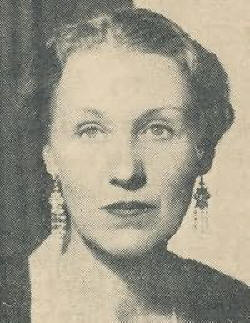Queer Places:
Bridge End, Woking GU23 6NR, UK
All Saints, Wheatley Rd, Cuddesdon, Oxford OX44 9HB, UK
 Ann
Bridge (11 September 1889 – 9 March 1974) is the pseudonym of Mary Ann
Dolling Sanders, Lady O'Malley, also known as Cottie Sanders. Bridge wrote
14 novels, mostly based on her experiences living in foreign countries, one
book of short stories, a mystery series, and several autobiographical
non-fiction books.
Ann
Bridge (11 September 1889 – 9 March 1974) is the pseudonym of Mary Ann
Dolling Sanders, Lady O'Malley, also known as Cottie Sanders. Bridge wrote
14 novels, mostly based on her experiences living in foreign countries, one
book of short stories, a mystery series, and several autobiographical
non-fiction books.
The seventh of eight children of an English father, James Harris
Sanders (1844–1916), and an American mother from Louisiana, Marie Louise
Day (1852–1923), she was named Mary Ann Dolling Sanders and later
nicknamed "Cottie". Her father was a successful international salesman of
metal products. In 1900, her parents took all their children on an
overseas trip to Paris and Switzerland, and Cottie, "born with an
inexplicable craving for heights," was enchanted by the Alps and became
interested in mountain climbing. The family continued to spend summers in
Switzerland.[2]
The Sanders family moved to London in 1904, when Cottie's father
encountered financial difficulties. Cottie passed the entrance exams to
enter Oxford University, but did not attend, instead staying home to help
her mother recover from the death of a son. She lamented missing "the
mental discipline and the serious scholarship a University can give."
Intellectually, she described herself as "half-baked."[3]
By 1911, her father had lost almost all of his fortune, and the family
moved into a six-room flat in London. Cottie went to work as an assistant
secretary for the Charity Organization Society. She described herself
during this period as poor but happy.[4]
In 1913, on a visit to Argyll, Cottie met Owen St. Clair O'Malley, a
British diplomat. They were married on 25 October 1913. The couple had two
daughters and a son.[5]
The marriage was apparently not a happy one. She was described as "stormy,
troubled, and troublesome" and "an unloved wife who made herself 'one of
the best-loved of all women novelists' in the twentieth century."[6]
A dust jacket of one of her books in 1949 stated that "she became the
youngest member of the Alpine Club at the age of 19, with sixteen
first-class ascents to her credit. She is a great gardener; she has an
interest in and knowledge of archaeology rare in her sex; and she has deep
learning in her own craft of writing."[7]
In 1909, Cottie Sanders met mountain climber
George
Mallory in Zermatt, Switzerland. The two became close friends and
mountain climbing partners. Cottie shared Mallory's "mystical love of the
mountains." The relationship between the two is elusive. She was a
"climbing friend" or a "casual sweetheart." She called him the first
friend she had made on her own. When Mallory died on Mount Everest in
1924, Cottie wrote a memoir of him. Her memoir was never published, but it
provided much of the material used by later biographers such as David Pye
and David Robertson and a novel Everest Dream.[8]
In 1919, the O'Malleys moved to Bridge End, a hamlet in Ockham, Surrey.
Cottie later took the name of the hamlet, "Bridge," as part of her pen
name, along with her middle name Ann. In 1925 she and her children
accompanied her husband abroad to a diplomatic posting in Beijing, China.
She returned to England in 1927 because of a sick child and began writing
to supplement the couple's income. In 1932, her first, and best known
novel, Peking Picnic, , was published under her pseudonym of Ann
Bridge. It was a success and won the Atlantic Monthly prize of $10,000.
She followed that novel up with several others that featured restless,
upper-class heroines in exotic environments. She visited Albania twice in
1934 and in 1936 which resulted in the novel Singing Waters. . She lived with her husband in several
countries besides China, including Turkey and Portugal. In 1941, fleeing
German advances, the O'Malleys escaped via the Trans-Siberian Railroad and
Cottie, or Ann Bridge, spent a year in the US before returning to Turkey.[9]
Bridge's novel Illyrian Spring (1935) is credited with
increasing tourism to Yugoslavia. Frontier Passage (1942) was a
source of information used by British intelligence to set up a World War
II anti-German resistance movement in Spain. The Dark Moment ( (1951)
traces the decline of the Ottoman Empire and the role of women in the
revolution.[10]
In her later years, Bridge turned more toward writing auto-biographical
works and a mystery series featuring an amateur sleuth named Julia Probyn
and set in several different countries. One of her last books was
Moments of Knowing about her experiences with the paranormal.
Although very popular in their day, Bridge's books are mostly out of
print and have received little critical attention, generally being
regarded as "entertaining travelogues." She explored "serious human
relationships" in exotic locales and described personal, historical, and
political developments with skill and veracity. Her protagonists have been
described as "snooty."
[11]
My published books:


BABACK TO HOME PAGE
- https://en.wikipedia.org/wiki/Ann_Bridge
 Ann
Bridge (11 September 1889 – 9 March 1974) is the pseudonym of Mary Ann
Dolling Sanders, Lady O'Malley, also known as Cottie Sanders. Bridge wrote
14 novels, mostly based on her experiences living in foreign countries, one
book of short stories, a mystery series, and several autobiographical
non-fiction books.
Ann
Bridge (11 September 1889 – 9 March 1974) is the pseudonym of Mary Ann
Dolling Sanders, Lady O'Malley, also known as Cottie Sanders. Bridge wrote
14 novels, mostly based on her experiences living in foreign countries, one
book of short stories, a mystery series, and several autobiographical
non-fiction books. 